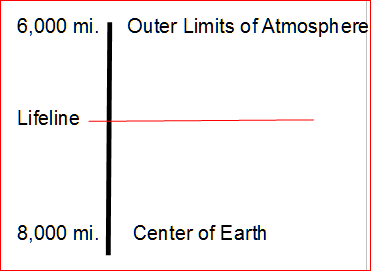Thus the heavens and the earth were finished, and all the host of them. And on the seventh day God ended his work which he had made; and he rested on the seventh day from all his work which he had made. And God blessed the seventh day, and sanctified it. Gen 2:1-3
During Creation the Creator established the foundations of the earth and then filled them with purpose, beauty, and life. He turned darkness into light, confusion into order, and emptiness into abundance. Some things He separated and others He brought together. In all this we have observed close parallels to the Plan of Salvation, the Messiah’s work, and the early transfer of responsibility for teaching and spreading the Gospel from the Teacher to the students.
Toward the end of Creation Week God produced, among other things, four categories of creatures: two from the waters and two from the earth. And here again we see a further development of Redemption, how each type of creature aptly describes the growth of faith until we have man fully restored into his Creator’s image.
If the Creation Story were to be used as a type of re-creation, one would think the first six days would complete the transformation process. We start out in a total mess, confused, hopeless, completely controlled by troubled and sometimes violent emotions, yet without purpose or positive direction in life. Then God graciously sends light and warmth into our cold and self-centered heart. Though we don’t recognize Him as our Saviour, we notice a positive change as we turn toward the Light. God then introduces benevolence into our life, the idea of using our meager resources for the benefit of others, and we continue to grow away from self-centeredness. Pleased with these new directions we begin seeking out others of like mind. As we interact with them we see personal weaknesses in a clearer light. When confession and forsaking them follow, we learn submission to God’s limits, hearts are united and God’s Spirit brings new life and purpose. Christ eventually makes Himself apparent as the Messiah, the Son of Righteousness, and we bask in the new light He brings to us.
Then follows guidelines for witnessing as the Messiah begins transferring more of His work into our hands. Faith grows. Christlikeness becomes more recognizable, until finally God has our heart in full submission and adoration. Our image is, once again, restored into His perfect likeness as were Adam and Eve before sin— happy, holy, and healthy as children of God. John the Revelator summed up the completed picture, looking at those who live to see Jesus coming in the clouds:
Here is the patience of the saints: here are they that keep the commandments of God, and the faith of Jesus. Rev 14:12
Yet, strangely, Creation Week is not complete. God has one more day. What more is needed beyond order and organization, useful and meaningful activity, abundance and quality, and a faith that mirrors the Saviour’s? He has already put great systems into place, filled the earth with beauty, abundance, and wealth, and given each creature, including man, a purpose, direction, and a mate. And He pronounced them all “very good” (Gen 1:31). Yet He is not finished. He now turns to the final Day of Creation/Re-Creation which epitomizes the whole purpose of the last six days.
THE SEVEN DAY ENIGMA
The seventh Day of Creation has puzzled man ever since the Fall recorded in Genesis 3. Feasting from the Tree of Knowledge of Good and Evil has numbed our senses, clouded our thinking, and satiated our longings until we think we have need of nothing else. So why the seventh Day?
Nature supports the daily cycle as our planet turns on its axis. One complete revolution begins a new day. By observing celestial and climatic phenomena we can also determine monthly, seasonal, and yearly cycles, when one interval ends and a new one begins. But not so with the week. Its preservation appeared for many years to be mostly historical, an event recorded and passed from generation to generation from the beginning of time as we Earthlings know it. Curiously though, today, throughout most of the world, “weeks” are always seven days long.
However, the modern science of chronobiology (the study of how living things handle time), assisted by the resolving power of computers, recently discovered–much to everyone’s surprise–innate seven-day (circaseptan) cycles in a wide variety of life forms, from primitive alga cells known as mermaid’s wineglass (Acetabularia mediterranea) to bees in Brazil that don’t work on the 7th day (Sabbath), and all the way up to humans. Yes, we have them too. This inherent seven-day rhythm has to do with the internal logic of the body, not with the external logic of the world and universe around it.
In his chapter “The Importance of Time,” Jeremy Campbell reports:
“These circaseptan, or about weekly, rhythms are one of the major surprises turned up by modern chronobiology. Fifteen years ago, few scientists would have expected that seven-day biological cycles would prove to be so widespread and so long established in the living world. They are of very ancient origin, appearing in primitive one-celled organisms, and are thought to be present even in bacteria, the simplest form of life now existing.” [Jeremy Campbell, Winston Churchill’s Afternoon Nap, (New York: Simon and Schuster, 1986), p. 75]
Doctors have long observed that response to malarial infection and pneumonia crisis peaked at seven days. Organ transplants face similar crises as the body’s immune system attacks the foreign organ. Campbell explains:
“When a human patient receives a kidney transplant, there is a rhythm of about seven days, a predictable rise and fall in the probability that the body’s immune system will reject the new kidney. A major peak of rejection occurs seven days after the operation, and when a serum is given to suppress the immune reaction, a series of peaks occurs, with increasing risk of rejection, at one week, two weeks, three weeks and at four weeks, the time of the highest of all.” [Campbell, p 76.]
Where Nature would come up with a 7-day cycle is a mystery… to those who don’t read their Bibles. There we read that the 7-day cycle is original with God, and He uses the number often to denote divine involvement. Just look through the last book of the Bible, called the Revelation of Jesus Christ, for example. Sevens are all over the place! We can think of seven as a fingerprint of God.
This weekly cycle, then, should point us back to God, as the 4th Commandment enjoins. There is no other influence we can find in Nature to credit it with.
For more information on this subject look up “Circaseptan Rhythm” on the internet. Now, back to Creation Week.
THE REST: OUR FIRST CLUE
As we watch the sun set on the sixth day of Creation we notice God doing something different. He sets His “creative tools” aside and seems to be waiting for something. Moses notices it too as he has been observing the Creation/Re-Creation Story unfold.
Thus the heavens and the earth were finished, and all the host of them.And on the seventh day God ended his work which he had made; and he rested on the seventh day from all his work…
We would think that after God finished making our beautiful world and forming man and woman in His own image that He would return to His home and His “duties” as Sustainer of the universe. But He doesn’t. To Him Creation Week is not complete. The seventh day was not a “catch-up” day, a time to “tie up loose ends” or “clean up” after completing a job. To finish a work on the seventh day is, in Hebrew phrase, not to do any part of it on that day, but to cease from it as a thing already finished. Neither was it to be a mindless play day. The record states simply that by the end of the 6th Day God’s creative work was ended and He “rested”.
The Hebrew word for “rest” defines it as a “repose (a stopping of exertion)”, “the keeping of Sabbath.” Why would God, whose Word disparages the slothful, and commends those who are “full of good works” and who trade wisely on their talents, create a day of apparent inactivity?
Some people seem to lose their identity when they are not busy. Have you ever been asked how your week was? If you responded with something like, “Busy, busy, busy”, what was the reply? Nine times out of ten it was probably, “Good!”, or “Awesome!”, or “Great!”. For some reason we equate busyness with success, importance, accomplishment. Take that away and what do we have left? Perhaps that is exactly the point for “resting” here. It prepares us for what really counts with God, the blessing He has in mind for us.
On this day all the rest of Creation Week finds its fulfillment. For without Day 7 the purpose for Days 1-6 would not exist. Day 7, we will see, is to keep alive the fact that we are not on this earth to just enjoy its abundance and beauty. It all has a higher purpose.
Try some quietness and see what it does to you and a child, spouse, or friend. For one day turn off the TV, the cell phone, the radio, the MP3 players or other music devices, don’t pick up the newspaper or magazine, or turn on the computer. Stay away from cities or busy neighborhoods or movies. No sports or table games. And what do you have left? Just each other. Now if that doesn’t test the quality of your friendship, nothing will!
Well, that’s not what God is asking here, but it does go somewhat in that direction.
Was God “tired”? Of course not! He is the source of power itself. Why then did He “rest”? Why didn’t He “rest” back at His home? Why tarry around our little earth? Whatever the explanations, Moses simply records it as part of Creation Week, a recurring work-free event for Earthlings to consider throughout ceaseless ages.
To understand this 7th Day “rest” we can go to another account of this Creation Day.
. . .in six days the LORD made heaven and earth, and on the seventh day he rested, and was refreshed. Exodus 31:17 [see also Exodus 23:12]
This last Day involved not only a ceasing from weekly labors but also a refreshing. In the original language the word means “to be breathed upon”, as if by a current of air. Something happening during that 24-hour period would revive the spirit of God and man as a cool breeze refreshes a hot, weary traveler. What that is we shall now consider.
CREATION’S PURPOSE UNFOLDS
As we examine the “event” on this final day of Creation we sense something unusual, yet understandable. From the Creator’s perspective His “work” is done, yet the purpose for the “work” is not. The crowning act of Creation up to this point has been the making of man, male and female, in His own image. And God has been lavish in His preparations.
This illustration represents the total area prepared for the existence of man, from the center of the earth to the outermost limits of our atmosphere (called the exosphere), a radius of approximately 14,000 miles. That’s approximately 11 ½ TRILLION cubic miles of environment so a single man and woman could live and move about freely, comfortably, and happily. The red line represents the bottom 3.5 miles of atmosphere and a few feet of topsoil, the only part that actively supports life. That’s like 1/4000ths of the total volume. And of just that 1/4000ths, a single man or woman takes up about 1/50 million billionth of that space! [You math gurus might check my figures, but I think I did it correctly.]
outermost limits of our atmosphere (called the exosphere), a radius of approximately 14,000 miles. That’s approximately 11 ½ TRILLION cubic miles of environment so a single man and woman could live and move about freely, comfortably, and happily. The red line represents the bottom 3.5 miles of atmosphere and a few feet of topsoil, the only part that actively supports life. That’s like 1/4000ths of the total volume. And of just that 1/4000ths, a single man or woman takes up about 1/50 million billionth of that space! [You math gurus might check my figures, but I think I did it correctly.]
Why would God invest so much space? Whatever it took to make man, God would do. The Bible says He wanted someone like Himself to enjoy, to spend time with, someone who could appreciate His feelings and understand His thoughts, someone who could sympathize with Him in His work of creating, sustaining, and (later) redeeming. [I touch on this a little bit in one of my Heaven articles. Click here to read it.] This last day of Creation Week encapsulates this purpose, this intent to fellowship with mankind. The “resting” (for both God and man) was part of that purpose. Be still, and know that I am God. Psalm 46:10
This lavish display on God’s part would not end with Creation. As we look at where He placed the Lifeline (8000/14000 = 8/14 = 4/7 of the distance from the center of the Earth to the outer limits of the atmosphere) we notice He placed another Lifeline along the timeline of Earth’s existence, also in exactly the same location!
Our world is approximately 6000 years old and Jesus will soon come to take His faithful ones to heaven. 1000 years later they all will return, with the New Jerusalem, for the punishment of the wicked and to remake this earth into a new world. That means the total existence of this world will be about 7,000 years. 4,000 years after Creation God sent His only begotten Son to become one of us, and to die in our place so we can have the choice to live with God forever (4000/7000 = 4/7 of Earth’s timeline). What a generous sacrifice! God established another Lifeline—our opportunity to live forever through the gift of God’s only begotten Son. And the 4th day of Creation encapsulates the coming of the Messiah (the sun) to this earth and the establishment of His kingdom (the moon and stars). Coincidence?
God loves to be with His people. We see Him visiting Adam and Eve in the cool of the day (Genesis 3:8). Even though this dear couple thwarted God’s purpose for them notice how gentle God was. We later read about Him asking His rebellious people to make Him a sanctuary so He could dwell with them during their recovery from sin (Exodus 25:8). This was the people God knew would rebel against Him all the way. Finally, when sin seemed to have accomplished its woeful effect on Earthlings, robbing them of real happiness as well as hope, we read how He, the Creator, became one of us, veiling His glory and being incarnated as a human, so He could draw close to us in our sinful condition and help point us heavenward again. So it should not surprise us that when He made our world He would tarry one more day to enjoy the work of His hands, to fellowship with those made in His image… and to immortalize that intent in a monument of time.
THE BLESSING
As a groom awaits the waking of his bride from their first night’s sleep together, so the Creator waits for those He loves to awake from their first Earth-bound slumber. But He does not wait in idleness. While Adam and Eve slept God, the Creator of the Day, prepares this special period with a blessing.
This is the day which the LORD hath made; we will rejoice and be glad in it. Psa 118:24
To “bless” is to will some good to the object of the blessing. In this case God blessed a unit of time that all who enter this 24-hour period purposefully would receive some special benefit. Time is the only thing that has unencumbered access to everyone. This first Sabbath was a day in which God Himself took delight. Having finished all His works the Creator looked over them as very good and then pronounced this day a good and happy day (what “blessed” means). Jesus used this meaning of “blessed” in His Sermon on the Mount. “Blessed” (happy), He said, are those who are “poor in spirit,” who “mourn”, who are ”meek,” who “hunger and thirst after righteousness”. (Matthew 5:3-10). But there is more to this blessing than simply being a day of delights and rejoicings.
This is actually the third blessing of Creation. The first two were on groups of living forms (fish and birds and man and woman). In the case of fish and birds (Genesis 1:22) the result of the blessing was fruitfulness and multiplication, as was also with humans (verse 28), but with mankind God added the purpose to replenish the earth, and subdue it: and have dominion over the fish of the sea, and over the fowl of the air, and over every living thing that moveth upon the earth. To “bless” something, then, is also to “empower” it. We can see this in Esau’s desperate pleading for his father’s blessing. His brother Jacob received the blessing by deceit yet it could not be revoked. Note all that such a blessing affected.
Right after Isaac had given Jacob his blessing and Jacob had gone, Esau came back from hunting. He cooked the tasty food, brought it to his father, and said, “Father, please sit up and eat the meat I have brought you, so you can give me your blessing.” “Who are you?” Isaac asked. “I am Esau, your first-born son.” Isaac started trembling and said, “Then who brought me some wild meat right before you came in? I ate it and gave him a blessing that cannot be taken back.” Esau cried loudly and begged, “Father, give me a blessing too!” Isaac answered, “Your brother tricked me and stole your blessing.” Esau replied, “My brother deserves the name Jacob, because he has already cheated me twice. The first time he cheated me out of my rights as the first-born son, and now he has cheated me out of my blessing.” Then Esau asked his father, “Don’t you still have any blessing left for me?” “My son,” Isaac answered, “I have made Jacob the ruler over you and your brothers, and all of you will be his servants. I have also promised him all the grain and grapes that he needs. There’s nothing left that I can do for you.” “Father,” Esau asked, “don’t you have more than one blessing? You can surely give me a blessing too!” Then Esau started crying again. Gen 27:30-38 CEV
This third blessing is not directly on creatures, but instead, as was mentioned, on a period of time, a 24-hour day. Here God wills some good and empowerment to this day, some benefit that is not associated with works or daily labor, for that has ceased on the 6th Day. The blessing given to this day, though it was spoken in reference to a period of time, was actually for the benefit of man. No other day of Creation had this unique distinction, nor could it be, for this blessing required the cessation of daily labor. Jesus enlarged on this blessing when He was talking with some religious leaders.
And he said unto them, The sabbath was made for man, and not man for the sabbath. Mark 2:27
The Pharisees in Christ’s time did not understand this purpose of the Sabbath. They thought it was merely the cessation of work, any kind of work. But the Saviour/Creator explained its true intent. The seventh day was intended to be a day of rejoicing and refreshment for man as well as beast.
Actually, what the Creator created on this special day, was a weekly leveling in relationships. On this day master and slave and even the stranger within their gates all enjoy the same blessing. Even the beasts of burden are included!
Six days thou shalt do thy work, and on the seventh day thou shalt rest: that thine ox and thine ass may rest, and the son of thy handmaid, and the stranger, may be refreshed. Exodus 23:12
Then said Jesus unto them, I will ask you one thing; Is it lawful on the sabbath days to do good, or to do evil? to save life, or to destroy it? Luke 6:9
And answered them, saying, Which of you shall have an ass or an ox fallen into a pit, and will not straightway pull him out on the sabbath day? Luke 14:5
The blessing of the 7th Day would enable man and beast by being “refreshed” for doing acceptable work in the new week. To help us understand the cause of the blessing, God did one more thing while the innocent couple slept …
HE SANCTIFIED THE DAY.
And God blessed the seventh day, and sanctified it… Genesis 2:3
To “sanctify” something, whether it be a person, place, or period of time, is to “set it apart for a special (holy) purpose”. What makes it “holy”?
One time, to get Moses’ attention, God entered into a bush in the desert and set it aflame. Because the bush didn’t seem to be consumed by the fire, Moses approached to get a closer look. God spoke to him out of the bush, saying, put off thy shoes from off thy feet, for the place whereon thou standest is holy ground. (Exodus 3:5) God’s presence made the ground “holy”. On this last day of Creation God committed Himself to meet with those He loves in a special way. He Himself would sanctify the sacred hours BY HIS PRESENCE.
By so marking this day with His presence it was to become a day of fellowship, worship, a time to reflect on God’s creation, His person, and His purposes. By putting God’s interests foremost— leaving the common labors and busyness of the week behind as well as the seeking of our own pleasures— we enter a dimension of life that gainful employment alone cannot provide. By so connecting with the Supreme Deity and with others we get the 7th Day blessing & enabling: our spiritual batteries get recharged.
If thou turn away thy foot from the sabbath, from doing thy pleasure on my holy day; and call the sabbath a delight, the holy of the LORD, honourable; and shalt honour him, not doing thine own ways, nor finding thine own pleasure, nor speaking thine own words: Then shalt thou delight thyself in the LORD; and I will cause thee to ride upon the high places of the earth, and feed thee with the heritage of Jacob thy father: for the mouth of the LORD hath spoken it. Isa 58:13-14
God made man in His image, as a social Being. We were to have intercourse with Him, to sympathize with His feelings and His purposes. And to encourage this relationship God capped Creation Week with a special period of time when the clamor of business is silenced, the focus on gain and acquiring more stuff is set aside, and we can experience in a special way His holiness (presence) and blessing—as the sinless angels enjoy in heaven. And the blessing is magnified as we fellowship with others of like mind.
Not forsaking the assembling of ourselves together, as the manner of some is; but exhorting one another: Heb 10:25
A BAG OF GOLD NUGGETS
In our theme text, Genesis 2:1-3, we read of no command to keep the 7th Day holy. Instead we just read what God Himself did. With His work of the week completed the Creator tarried one more day to fellowship with those just made in His image. And during that 24-hour period He added a special blessing, a unique empowerment. Then God immortalized the event by setting that day apart from the rest of the week, sanctifying it with His presence. When God does something, it is forever.
I know that, whatsoever God doeth, it shall be for ever: nothing can be put to it, nor any thing taken from it… Ecclesiastes 3:14
The specialness of the 7th Day is prophesied to continue throughout ceaseless ages, long beyond the final eradication of sin.
For as the new heavens and the new earth, which I will make, shall remain before me, saith the LORD, so shall your seed and your name remain. And it shall come to pass, that from one new moon to another, and from one sabbath to another, shall all flesh come to worship before me, saith the LORD. Isaiah 66:22-23
The blessing is there, out in the open for all to take. It’s like God putting a bag of gold nuggets in our pathway one day a week with a sign on it: FREE FOR THE TAKING. If we desire His special blessing, and feel a desperate need for His empowerment, if we really want His fellowship and wish to worship Him as our Creator/Redeemer, it requires only a choice on our part to reach out and accept the gift… on His terms.
But some try to manipulate the conditions.
-
They try to receive the blessing without the REST, without the ceasing of labor or personal pleasures.
-
Or they ignore God’s pronouncement, His sanctifying the Day for all eternity, and demand He meet with and bless them on a day of man’s choosing.
-
Or they treat the Day as an ordinary day of the week. Their common dress, common demeanor, and common delights all remain the same, yet they wonder why there is no “specialness” to the Day.
God understands what sin can do to our thinking.
-
It’s benumbing powers can put us into a death-like stupor, where life has lost its beauty and wonder and joy. So we cannot imagine how God’s blessing could change anything in our life.
-
Sin makes man think that God is like a man—fickle, changeable, undependable and unpredictable, tyrannic, unfair, selective, and doing only what pleases himself. So we can’t trust what He did on the 7th Day of Creation to still be effective today.
-
Sin also has an accusing finger, making us feel unworthy, unloved. We do not deserve any free gifts. We must work for them. Whatever is in the bag at the end of the week is predictable, what we have earned, not what God has graciously given.
So God had this historic event included in His Ten Commandments, the divine principles by which all heaven operates. By surrounding the Sabbath command with other commandments that appeal to our reason and sense of fairness, God establishes anew the perpetuity of the 7th Day blessing. It remains as He originally intended, as a relationship-oriented day where man can commune with his Creator God, a “free bag of gold nuggets” for our taking at the end of each week.
And God makes it very clear through His Word that we cannot keep any commandment, let alone ALL of them, without His special help. They are divine. We are sinners. His grace alone is sufficient to help us live by heaven’s precepts, even on the 7th Day.
For sin shall not have dominion over you: for ye are not under the law, but under grace. What then? shall we sin, because we are not under the law, but under grace? God forbid. Rom 6:14-15
And he said unto me, My grace is sufficient for thee: for my strength is made perfect in weakness. 2Co 12:9
Still there are those who cannot surround the simple truth that God blessed a certain Day of Creation and sanctified it forever, a Day that was specifically made for man in his sinless or fallen condition. So God sent His Son into the world to show them His love for them and give them (us) an example of how to live the Godly life. And the specialness of the Sabbath was part of it.
And he [Jesus] came to Nazareth, where he had been brought up: and, as his custom was, he went into the synagogue on the sabbath day, and stood up for to read. Luke 4:16
Jesus tried to recover the true purpose of the Sabbath from the centuries of misuse and then taught His followers how important and long-lasting the Sabbath was. Looking down the corridors of time He saw the 7th Day Blessing still in effect after His crucifixion.
But pray ye that your flight be not in the winter, neither on the sabbath day: Matthew 24:20
The early Christian church also followed His example. Note that both Jew and Gentile understood that the Sabbath day was still special to the Apostles.
But when they [Paul and his company] departed from Perga, they came to Antioch in Pisidia, and went into the synagogue on the sabbath day, and sat down. Acts 13:14
And when the Jews were gone out of the synagogue, the Gentiles besought that these words might be preached to them the next sabbath. Acts 13:42
And on the sabbath we went out of the city by a river side, where prayer was wont to be made; and we sat down, and spake unto the women which resorted thither. Acts 16:13 [There were no synagogues in this city in which to worship, so they went out into Nature. Remember, they had been in the city for some time prior to the Sabbath, so if it was just another day to them now (as Christians under a new covenant free from the Moral Law), why mention this special desire to seek a quiet place for prayer on the Sabbath?]
And he reasoned in the synagogue every sabbath, and persuaded the Jews and the Greeks. Acts 18:4
When The Creator ended His work on the 6th Day He noted that everything done was “very good” (Genesis 1:31), yet in His mind Creation was yet incomplete. It needed the 7th Day blessing. So He set aside a period of time when He and His children could get together and fellowship without distractions. It would be a time for worship, healthful rest, and holy deeds.
Yet there was still one more purpose God had in mind for this day.
THE SIGN
Part of God’s characteristics is His all-knowing, infinitely wise understanding of the future. In His foresight the Creator knew His people would be harassed, tormented, and maligned, and He intended to encourage them at the very outset of Creation, and He would use the 7th Day Blessing to do it. It would become a “sign”, a “flag” or “mark” that would not only distinguish His people from the careless, worldly throng around them, but also encourage them in their growth toward Godliness.
Moreover also I gave them my sabbaths, to be a sign [mark] between me and them, that they might know that I am the LORD that sanctify them. Ezekiel 20:12
And hallow my sabbaths; and they shall be a sign [mark] between me and you, that ye may know that I am the LORD your God. Ezekiel 20:20
As the Sabbath blessings came without any works of man, so the gifts of God’s grace wold also come. It would be the Lord who sanctifies, and those who received the Sabbath blessing properly would ever keep this in mind. Salvation would come as a gift of God, not by any works of man… just like the Sabbath does every week. We can accept it or reject it. It’s our choice.
At the end of time something would distinguish God’s people from Satan’s “marked” worshipers. It follows that it could just be the Sabbath “mark” spoken of in Ezekiel 20 above, for God’s children would also be faith-oriented Commandment-keepers (of which the Sabbath is part), and depending solely on Christ’s righteousness for their salvation (also which the Sabbath enjoins).
And I saw thrones, and they sat upon them, and judgment was given unto them: and I saw the souls of them that were beheaded for the witness of Jesus, and for the word of God, and which had not worshiped the beast, neither his image, neither had received his mark upon their foreheads, or in their hands; and they lived and reigned with Christ a thousand years. Revelation 20:4
Here is the patience of the saints: here are they that keep the commandments of God, and the faith of Jesus. Revelation 14:12
When the world encroaches on God’s children, when it tries to dissipate their energies, benumb their senses, distract their purposes, the 7th Day blessing still awaits to refresh and enliven, to renew the hopes and empower their faith for a new week of service to all mankind. Thus spending time with their Creator/Redeemer marks them as God’s children while the world vainly strives for similar blessings from man’s creations. Yet all they can gather is the work of their own hands and that in a bag full of holes.
Ye have sown much, and bring in little; ye eat, but ye have not enough; ye drink, but ye are not filled with drink; ye clothe you, but there is none warm; and he that earneth wages earneth wages to put it into a bag with holes. Haggai 1:6
That was not God’s intent for His Creation. He wanted all to be happy, and our only source of happiness and fulfillment is a committed and loving relationship with Him, as the 7th Day blessing describes.
One Sabbath I thought I would follow God’s counsel to Moses at the bush, so I quietly took off my shoes when I first entered the church. Left them in the foyer, to the back side of a rocking chair. And then slipped them back on at the end of church. It was very interesting the feeling I had all during the services, like God and I were closer. I’ve never experienced such a feeling by any other thing I did in god’s house before. I think I will continue to do that from now on, like they do in Thailand.
I really have a hard time surrounding this thought:
If I worship God on the 1st day or any other day than the 7th, what purpose would there be in a 7 Day Creation Week? All the other days have specific things the Creator did. Why do we go quiet when it comes to the last day of Creation Week? God did things on that day, too. He blessed it and sanctified it, and rested on it. How can Christians who believe in a literal Creation Week justify obliterating the whole purpose of that last day? Who is greater than God to turn it into just a play day–or another work day? I really, really don’t understand.
CREATION / RE-CREATION COMPLETED
We have looked at the Creation story as a type of how fallen humanity is or can be restored to God’s original purpose of oneness with Himself. We saw the miserable state of things before the Creator began the “recovery” process. We observed how God methodically, purposefully, skillfully, and graciously generated new pathways, new vistas, new foundations. This affected not only the inorganic world of matter and rays, but also the realms of life in all its forms.
We have seen the dawn of hope, the ministries of service and community. We have examined the cryptic descriptions of witnessing and the growth of faith. Yet, in all this, we have had little communion with God directly… until the very end of the week.
Without the blessing of the 7th Day exclusive of daily toil, being made (or remade) in God’s image would have little benefit to God Himself. It would be like saving up for nearly a lifetime to buy a special car, and then never having the time to drive it and share it with others.
The Sabbath Day is, in a sense, the tithe of our weekly allotted 168 hours. Approximately 16 of those are in wakefulness on the Sabbath Day, when we can consciously worship Him as our Creator and Redeemer, consider His Word, fellowship with others in His family, and participate in holy deeds. It is during these special hours that we are signally blessed, refreshed, and empowered to face a new week of service to the dying world about us.
Yet the 7th Day would have no value without the six days preceding it. Creation Week is complete only as God designed it—six days of weekly toil and service and one day of healthful rest and refreshment in God’s presence, as the fourth Commandment enjoins.
And equally so in its spiritual counterpart, the re-creation of man in God’s image. Without the six “days” of new generations, man would be without capacity to worship his Redeemer. He would not know Him, nor feel a need for Him. He would remain, as the Scripture states, “without form and void.”
So it makes perfect sense that the Creator/Redeemer would, in these last days, send a message of great importance to the world, a message that brings us back to Creation, all seven days of it.
And I saw another angel fly in the midst of heaven, having the everlasting gospel to preach unto them that dwell on the earth, and to every nation, and kindred, and tongue, and people, saying with a loud voice, Fear God, and give glory to him; for the hour of his judgment is come: and worship him that made heaven, and earth, and the sea, and the fountains of waters. Rev 14:6-7
But the seventh day is the sabbath of the LORD thy God: in it thou shalt not do any work, thou, nor thy son, nor thy daughter, thy manservant, nor thy maidservant, nor thy cattle, nor thy stranger that is within thy gates: For in six days the LORD made heaven and earth, the sea, and all that in them is, and rested the seventh day: wherefore the LORD blessed the sabbath day, and hallowed it. Exo 20:10-11
For a short study on this phrase “made heaven and earth and sea” and how in the 7 places it is found each relates to different aspects of worship of the Creator: click here.
It took seven days to complete Creation and to fully illustrate Creation’s counterpart, the restoring of God’s image in mankind, which is crowned with the seventh day’s blessing.
Lesson for the 7th Day: God knows best.






